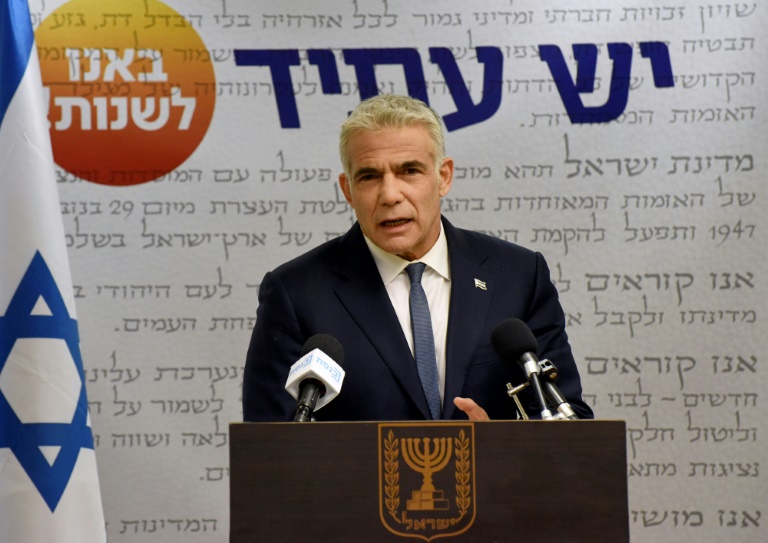Israeli politicians battling to unseat veteran Prime Minister Benjamin Netanyahu were racing against the clock Tuesday in talks to build a “change” coalition composed of bitter ideological rivals.
They have until a minute before midnight (2059 GMT) Wednesday to cobble together an administration that would end 12 straight years of rule by the hawkish heavyweight, Israel’s longest-ruling premier.
The high-stakes push is led by former TV presenter Yair Lapid, a secular centrist, who on Sunday won the crucial support of hardline religious nationalist Naftali Bennett, a tech multi-millionaire.
“The coalition negotiation team sat all night and made progress toward creating a unity government,” a Bennett spokesman said in a statement.
But to reach a 61-seat majority in the 120-seat Knesset, their unlikely alliance would also have to include other left and right-wing parties — and would probably need the support of Arab-Israeli politicians.
That would result in a government riven by deep ideological differences on flashpoint issues such as Jewish settlements in the Israel-occupied West Bank and the role of religion in politics.
Lapid, leader of the Yesh Atid party, was tasked with forming a government by President Reuven Rivlin after Netanyahu again failed to put together his own coalition following Israel’s fourth inconclusive election in less than two years.
Lapid has reportedly agreed to allow Bennett, who heads the Yamina party, to serve first as a rotating prime minister in a power-sharing agreement, before swapping with him half way through their term.
As lawmakers were entering the 11th hour a source close to the negotiations told AFP negotiators were hammering away to “finalize a deal as soon as possible.”
– ‘Greater goal’ –
Israel’s latest political turmoil adds to the woes of Netanyahu, who is on trial for criminal charges of fraud, bribery and breach of trust while in office — accusations he denies.
If he were to lose power, he would not be able to push through changes to basic laws that could give him immunity, and would lose control over certain Justice Ministry nominations.
The last-minute talks also follow a flare-up of fighting between Israel and Palestinian militants in the Gaza Strip, which ended after 11 days of deadly violence with an Egyptian-brokered ceasefire on May 21.
Netanyahu, who served an earlier three-year term in the 1990s, had warned on Sunday of “a left-wing government dangerous to the state of Israel”.
The premier, who heads the right-wing Likud party and has developed a reputation as a wily political operator, was scrambling to scupper the new alliance.
Likud’s lawyers tried to hobble the emerging coalition by challenging Bennett’s right to serve first as prime minister, given that it was Lapid who was charged with forming the government.
But the legal adviser to Israel’s president knocked down the challenge.
Opponents of the possible alternative government meanwhile accused Bennett and his right-wing partners of betraying their voters.
Spokesmen for both Lapid and Bennett confirmed to AFP that the two have received additional security protection.
Lapid said Monday that obstacles remained to build the coalition, but added: “That’s our first test — to see if we can find smart compromises in the coming days to achieve the greater goal.”
In order to build the anti-Netanyahu bloc, Lapid must sign individual agreements with seven parties, whose members would then vote in parliament to confirm their coalition.
They include the hawkish New Hope party of Netanyahu’s former ally Gideon Saar and right-wing secular nationalist Avigdor Lieberman’s pro-settlement Yisrael Beitenu party.
The centrist Blue and White party of Defence Minister Benny Gantz, the historically powerful centre-left Labor party and the dovish Meretz party would also join.
– Arab Israeli support? –
If all those parties indeed sign on, the emerging alliance still needs the backing of four more lawmakers.
For that, Lapid is counting on parties representing Palestinian citizens of Israel, which have not yet announced their intentions.
Mansour Abbas, head of the Islamic conservative Raam party, which has four seats, has generally voiced openness to any arrangement that improves living conditions for Israel’s 20 percent Arab minority of Palestinian descent.
Political analyst Afif Abu Much said Tuesday that Abbas would not pursue ministerial posts, but wanted chairmanship of two parliament committees and budgets for Arab communities.
He also aimed to revoke a law that has hardened penalties for illegal construction, which is seen to impact Arab communities disproportionately.
“They don’t want to be part of the government,” Abu Much told AFP. “What they want is to be the address of the Arab people in Israel.”
Political scientist Jonathan Rynhold warned that it would be unwise at this point to write off Netanyahu, “the best card player by miles”.
If Lapid fails to muster a majority, and lawmakers cannot agree on another candidate for prime minister, Israelis will return, yet again, to the polls.
Abbas told reporters Tuesday that negotiations appeared to be heading “in a good direction”.
But, he said: “until it’s finished, nothing is finished.”










